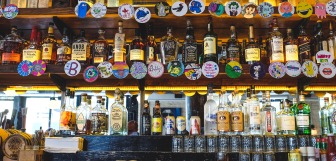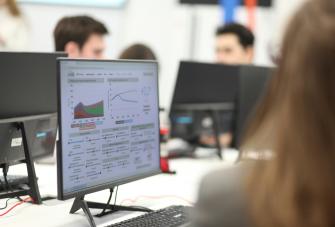How Much Does a Liquor License Cost in New York?
Newsweek reports that New Yorkers drink 2.2 gallons of alcohol per capita each year. Combining these figures with the 250+ million visitors the state receives annually, there will likely continue to be plenty of demand for alcohol for years to come.
While opening a bar or restaurant may sound like a smart idea, you will need to have all the right paperwork in order before you get started. Of all the documents you’ll need, one of the most important is your liquor license.
So, how much does a liquor license cost in New York? While costs vary, you can expect to pay between a few hundred to tens of thousands of dollars.
An overview of New York liquor licenses
New York separates liquor licenses based on production, consumption, and intent. For example, someone who makes wine will need a different license than the restaurant that serves it.
The four key liquor licenses available in New York include:
- On-premises licenses: The alcohol is consumed on-site, such as at a bar, restaurant, hotel.
- Off-premises licenses: Shoppers buy alcohol and consume it somewhere else. Perfect for liquor and grocery stores.
- Manufacturing licenses: If you produce your own alcohol at a brewery or distillery, you will need this license.
- Wholesale licenses: If you intended to sell to retailers, you will need a wholesale license. Retail stores can only buy alcohol from licensed wholesalers and manufacturers.
You can learn more at the New York Liquor Authority website.
Types of licenses
These four categories are quite broad, so the state offers specific licenses to match certain business models. For example, a nightclub that generates almost all revenue from liquor might night need the same license as a restaurant that earns 30% of revenue from wine and beer.
Also, there are many types of alcoholic beverages. If you only want to serve beer, why would you obtain a license for liquor?
Common licenses include:
- Ballpark Beer: Many people like to have a beer while watching sports. With this license, stadiums and sports complexes can sell beer to guests who pay admission.
- Bed and Breakfast: If you want to offer mimosas or a nightcap to your overnight guests, you’ll need this permit.
- Cabaret Liquor: New York City is full of music and dancing shows. As long as your venue offers musical entertainment and can seat 600 people, you can sell beer, wine, liquor, and cider.
- Catering Establishment: Private events will need this license to sell beer and wine to attendees.
- Chain Restaurant: This allows a licensee to add a new location.
- Club (Members Only): New York is full of members-only clubs. With this license, these organizations can offer beer, wine, or liquor to members and guests.
- Food Concessionaire: Some establishments serve alcohol but don’t prepare food. With this license, you can hire a food provider to offer meals. However, the food provider cannot serve alcohol.
- Golf Club: If you have a private golf club, you can offer all types of alcohol to members and permitted guests.
- Hotel: Depending on the license it obtains, a hotel can sell beer, wine, and liquor.
- Restaurant Brewer: Some breweries double as restaurants, so they can obtain additional licenses to sell alcohol for immediate and off-site consumption.
- Vessels: Do you want to offer drinks on your sightseeing boat? With a vessel license, you can sell beer or liquor legally.
On-Premises License Fees
You will need an on-premises license If you want customers to enjoy alcohol on your property. However, your business needs to comply with a few rules. Two of the most notable are the 200-Foot Rule and the 500-Foot Rule.
200-Foot Rule: No business can sell alcohol for on-premises consumption if it is within 200 feet of a school, church, or another place of worship.
500-Foot Rule: No more than four licensed businesses can co-exist within a 500-foot radius. However, this rule is discretionary, and your business can request an exception.
30-day Community Notice: All on-premise applications will be reviewed by municipalities, community boards, and elected officials. If there are any objections, the Authority could hold public Full Board hearings to hear any testimony or input.
Fees for on-premises licenses:
- Eating Place Beer (EB): $960 renewal cost every 3 years, $100 annual fee
- Hotel Liquor (HL): $4,352 renewal cost every 2 years, $200 annual fee
- Hotel Wine (HW): $960 renewal cost every 2 years, $100 annual fee
- On-Premises Liquor (OP): $4,352 renewal cost every 2 years, $200 annual fee
- Restaurant Wine (RW): $960 renewal cost every 2 years, $100 annual fee
- Tavern Wine (TW): 1,152 renewal cost every 2 years, $100 annual fee
Off-Premises License Fees
If you have a retail location, selling alcohol is a nearly surefire way to pad your profits. Like on-premise businesses, retail locations need to satisfy a few requirements before they can obtain a liquor license.
200-Foot Rule: No retail business can sell alcohol for off-premises consumption if it is within 200 feet of a school, church, or another place of worship.
NY Liquor Authority Questionnaire: The Liquor Authority will analyze revenue from the four closest liquor stores to your location. If their financial situation can not handle the added competition, your liquor store license may be denied.
Fees for off-premises licenses:
- Liquor Store (L): $4,098 renewal cost every 3 years, $200 annual fee
- Wine Store (W): $1,920 renewal cost every 3 years, $100 annual fee
- Drug Store Beer (DS): $330 renewal cost every 3 years, $100 annual fee
- Grocery Store Beer (A): $660 renewal cost every 3 years, $100 annual fee
- Grocery Beer & Wine (AX): $1,056 renewal cost every 3 years, $100 annual fee
- Drug Store Beer & Wine: $594 renewal cost every 3 years, $100 annual fee
Grow your business with Epos Now
Whether you are opening a retail business or a lively nightclub, you will need the right software and tools to operate smoothly. One of the most important devices you will need is the point of sale system.
A retail POS is a must-have device for collecting payments, processing transactions, and logging sales. Without it, you will need to do all math by hand and could not accept debit or credit cards.
On top of this, a POS system is crucial for bars and liquor stores. These devices automate many routine processes, increasing your efficiency and accuracy.
For example, these devices can track all wet inventory, down to the remaining pours in a bottle. Likewise, they can integrate with third-party programs like Mailchimp and QuickBooks.
Need a point of sales system? Contact Epos Now today to get started.




